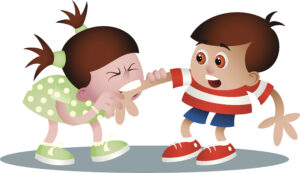Challenging Behaviours: Biting
Why do children bite?

Young children sometimes bite because they’re trying to cope with something. They might feel overwhelmed or not know how to express their needs. Understanding why they bite can help you figure out what to do.
Here are some common reasons children bite:
- They don’t have the words to say how they feel—like when they’re angry, excited, or frustrated.
- They feel overwhelmed by noise, lights, or too much going on.
- They’re curious and want to see what happens.
- They’re very tired.
- They’re teething and their gums hurt.
Biting back or using harsh punishments isn’t helpful. There’s no evidence that it works, and it can teach your child that biting is okay when they’re upset.
Check out the book “Teeth are Not For Biting” by Elizabeth Verdick, available at NL Public Libraries!
What can I do about it? (click to expand) »Think about what was happening right before your child bit someone. Ask yourself:
This can help you spot patterns and prevent biting in the future. If you see your child about to bite, try:
|
What should I do if my child bites another child? (click to expand) »
|
Remember: learning new behaviour takes time. If something doesn’t work, try a different approach. Talk to other parents, learn more about child development, or reach out to professionals for support.
Services related to this information:
- Contact your Public Health Nurse or healthcare provider to discuss your child’s behaviour.
- Contact your local Family Resource Centre for parenting programs and support.
- Visit your local library to check out some helpful books.
- 811 HealthLine (Newfoundland & Labrador) – Call 811 or 1-888-709-2929 / TTY 1-888-709-3555

